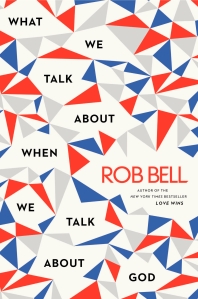 Rob Bell is in a new place with a new book. What We Talk about When We Talk about God is his first publication since leaving Mars Hill, the off-beat mega church near Grand Rapids, MI, that he founded in 1999. Bell is now writing, teaching, surfing and working on media projects in Southern California.
Rob Bell is in a new place with a new book. What We Talk about When We Talk about God is his first publication since leaving Mars Hill, the off-beat mega church near Grand Rapids, MI, that he founded in 1999. Bell is now writing, teaching, surfing and working on media projects in Southern California.
Despite these changes, people who are aware of Bell’s earlier material—books, speaking tours and Nooma DVDs—will find themselves in familiar surroundings within these newly printed pages. His signature cadence, humor and minimalism remain. Beyond these stylistic cues, major themes from previous works find new traction—the scientific wildness of Everything is Spiritual, the moral trajectory of The Gods Aren’t Angry, the assumption from Velvet Elvis that all truth is God’s truth.
Readers of theology and philosophy will also find continuity with Bell’s established method of interacting with heady theology in subtle ways. Bell avoids the jargon of academia, and he rarely quotes the theologians he is wrestling with, but these thinkers are quite present just below the surface. From a communication perspective, this is one of Rob Bell’s greatest gifts in ministry. He guides readers over the difficult terrain of theodicy, epistemology and moral philosophy—all covered in this latest book—in ways that focus us on the important issues without the distraction of opening a theological dictionary. Bell demonstrates that wrestling with life’s most important questions does not require esoteric terminology. Only a certain type of reader can appreciate Peter Rollins’ style of writing in How (Not) To Speak of God, but anyone can understand Bell’s reference to Rollins as “my friend Pete” (p. 95).
Moving from superficial observations to the heart of the book, Bell writes about vision, about seeing and knowing God. “This is a book about seeing, about becoming more and more alive and aware, orienting ourselves around the God who I believe is the ground of our being” (p. 15). This book is neither a traditional Bible study on the character of God (though biblical material is used throughout) nor a treatise on the classical “proofs” for God’s existence. Rather, it is an exploration of what we find when we take a step back from these questions and consider broader themes of human history, moral development, pain and meaning, integration, progressive revelation and implications of resurrection. We find a God behind it all, bigger than it all, connecting it all, and therefore it all matters—“what our experiences of God do at the most primal level of consciousness is jolt us into the affirmation that whatever this is, it matters. This person, place, event, gesture, attitude, action, piece of art, parcel of land, heart, word, moment—it matters” (p. 110).
This journey of seeing and knowing God proceeds by asking three questions: Do I believe God is with me always, throughout all of life’s experiences? Do I believe that God is really for me, that God is for everyone? Do I believe that God is truly ahead of me, calling me to participate in God’s beautiful kingdom of peace and community and beauty and compassion in ways that are in harmony with the long arc of justice?
These are troubling and probing questions with significant ramifications. The chapters devoted to each question left me wanting further exploration. This easily could have become a very long book (otherwise known as a seminary library). As covered in Drops Like Stars, the artist must know what is essential and have the courage to strip away all else. Bell takes quite seriously this philosophy of art, leaving us to take his work further with our own conversations, journals and blogs.
Central to this quest to know God—to see God with, for and ahead of us—is the theme of integration. This notion is explored throughout the book in ways that made me feel like I was holding the Bible while watching Tom Shadyac’s documentary, I Am. Reconciliation, interconnections, interdependence. We are on an amazing quest to holism—to realize and foster our deep connections with God, with each other, with our world, with all creation, and with the dimensions of our own being (e.g., our logic and intuition, our heads and hearts, our doubts and faith, our joy and suffering). Considering this list of couplets, am I open to the paradox of both in my search for truth and wholeness, to “both/and” ways of thinking as Chris Blake teaches?
Given this overview of the book’s major themes (and I admit to omitting many of the contours), there is one topic that Seventh-day Adventist readers will quickly press up against—the history of life on earth. Like many Christians, Rob Bell does not require young-earth creationism in order to value God’s work in history. I do not claim to know how exactly Bell understands issues of creation and evolution, but his ideas seem to be some form of theistic evolution. Adventist authors have quite thoroughly covered the scientific and theological implications of this issue—why it is compelling to some of us, and why it is seen as heresy by others of us—so I will not attempt to settle the controversy. I simply note that the issue is lurking in these pages, knowing that readers with various understandings will view his work with their own particular lens. In the end, I do not believe that Bell’s central questions and lines of reasoning are dependent on this one concern. That is, regardless of what one believes regarding how God brought the observed complexities of life into existence, the questions Bell asks are worth contemplating.
May we slow down, meditate deeply on the Word and on our experiences, listen intently, and be open to God’s ever-unfolding revelation of truth about Godself, about us, and about the universe God has placed us in. This is an important theme in the Adventist story—present truth.
– – –
 NOTE 1: Ivan, I hope you enjoy the gift from the two Andrews University alumni who stood in front of us in line to meet Rob Bell at the pre-release shindig.
NOTE 1: Ivan, I hope you enjoy the gift from the two Andrews University alumni who stood in front of us in line to meet Rob Bell at the pre-release shindig.
NOTE 2: Some of the book’s stories and themes were covered in the teaching Rob Bell gave at Mars Hill shortly before the book release. That sermon on “sloth” will soon be accessible here (March 10, 2013).
- Writing this review in the local public library. Why so serious?!




Great review, Jeff!